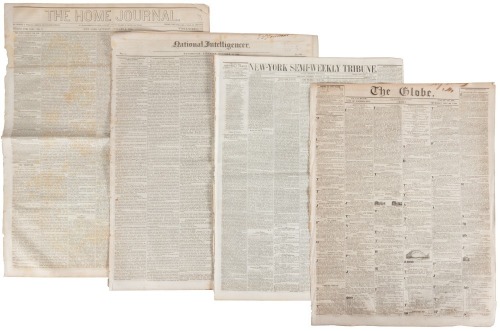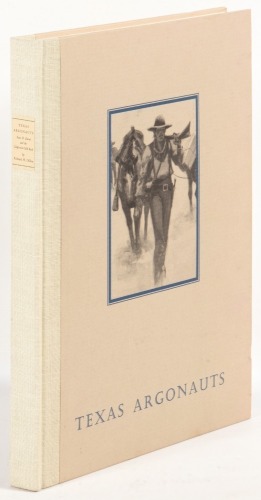Black notebook, 6.75 x 8.25 in., 60pp, with front label "The Property of Chas. E. Jerrett / Georgetown / California." Contains handwritten accounts of the California Gold Rush, which were likely recorded during the late 19th or early 20th century by Charles E. Jerrett, a probable descendant of Georgetown grocer and 49'er Daniel Jerrett. The recollections are presented as a series of stories, each one featuring a specific miner or miners. The opening page of the notebook describes his purpose in cataloguing the memories. The history of the leading characters of the days of 49 have been written, and the names of Marshall and Sutter are known throughout the world. But of the rank and file of Miners, of these who made the real history of the state we have but little record. So I am going to give a brief record of the doings of such men as Poor Old Lousy Bill and Mountain Tim who underwent the dangers of the overland trail, or the longer water routes, and whose lives were spent sometimes in the unsuccessful attempt to draw a future from our rich-creased hills. Georgetown, California, was founded on August 7, 1849, towards the northern end of the "Mother Lode." With the addition of a stage line in 1850 and a key location near the Carson trail, emigrants began pouring into Georgetown. Soon the town became a distributing point for supplies and a hub of mining activity, and by 1855, the bustling mining community contained a school, a church, a Masonic Temple, a variety of stores, and of course bars and gambling halls. It is in this setting and its vicinity that Charles Jerrett's stories unfold. He is a natural storyteller whose prose is lively and engaging. The characters he presents are unique and seemingly as legendary as the Gold Rush itself. Page 2 launches immediately into Jerrett's first anecdote, which features miners Jim Mooney "A great two-fisted son of the Emerald Isle," and Bill Stagg, "a small determined gentleman." Jerrett relates how Mooney lost a fortune to a failed bank, but soon made his money and then some back in the Hoggs Diggings mining camp. "Having an offer of $8000. for his North Fork stock he sold it taking the money and gold coin. Which he placed in a sack and carried home, saying, By Jesus, no more banks for me. I'll take care of my own money, and have a bank of my own. It was presumed that he buried it." Jerrett then goes on to describe how Mooney fell in love with a girl named Mary, the eldest daughter of a family that "kept a wayside resort which on account of the beauty of the two girls was well patronized by the miners." Mooney's affection for Mary is threatened, however, by the competing attentions of miner Bill Stagg, and the result is as typically rough and western as one might imagine. Jerrett writes: They met at the house one afternoon, and Mooney accused Stagg of passing remarks derogatory to his character. Stagg denied this, and upon this denial being made Mooney, a man as large as two of Stagg, struck him to the ground./Springing to his feet, Stagg drew his 12-inch Bowie. and before Mooney could place himself in the defensive made a quick upward slash, the knife passing through Mooney's heart. Without a sound, he fell dead./ Knowing that Mooney had buried the $8000. together with the gold mined at Hoggs Diggings, diligent search was made, but it was never found, and somewhere near where he lived a fortune is waiting for some lucky man. We hope more favored by damn Fortune, than was our two Pioneers, Jim Mooney lost his life, and Stagg his hearts desire. Story 2 features an anecdote about Mr. John Hogg, "a native of Tennessee who braved all the perils of a trip across the plains in 1849 to search for that elusive, metal, gold...Strike it today, spend it tomorrow was his motto, and it was so interwoven with the fiber of the man, that it existed to the last." Jerrett relays how Hogg and his partner discovered a large gold nugget, and then summarily spent it. God Almighty! was his [Hogg's] exclamati
Black notebook, 6.75 x 8.25 in., 60pp, with front label "The Property of Chas. E. Jerrett / Georgetown / California." Contains handwritten accounts of the California Gold Rush, which were likely recorded during the late 19th or early 20th century by Charles E. Jerrett, a probable descendant of Georgetown grocer and 49'er Daniel Jerrett. The recollections are presented as a series of stories, each one featuring a specific miner or miners. The opening page of the notebook describes his purpose in cataloguing the memories. The history of the leading characters of the days of 49 have been written, and the names of Marshall and Sutter are known throughout the world. But of the rank and file of Miners, of these who made the real history of the state we have but little record. So I am going to give a brief record of the doings of such men as Poor Old Lousy Bill and Mountain Tim who underwent the dangers of the overland trail, or the longer water routes, and whose lives were spent sometimes in the unsuccessful attempt to draw a future from our rich-creased hills. Georgetown, California, was founded on August 7, 1849, towards the northern end of the "Mother Lode." With the addition of a stage line in 1850 and a key location near the Carson trail, emigrants began pouring into Georgetown. Soon the town became a distributing point for supplies and a hub of mining activity, and by 1855, the bustling mining community contained a school, a church, a Masonic Temple, a variety of stores, and of course bars and gambling halls. It is in this setting and its vicinity that Charles Jerrett's stories unfold. He is a natural storyteller whose prose is lively and engaging. The characters he presents are unique and seemingly as legendary as the Gold Rush itself. Page 2 launches immediately into Jerrett's first anecdote, which features miners Jim Mooney "A great two-fisted son of the Emerald Isle," and Bill Stagg, "a small determined gentleman." Jerrett relates how Mooney lost a fortune to a failed bank, but soon made his money and then some back in the Hoggs Diggings mining camp. "Having an offer of $8000. for his North Fork stock he sold it taking the money and gold coin. Which he placed in a sack and carried home, saying, By Jesus, no more banks for me. I'll take care of my own money, and have a bank of my own. It was presumed that he buried it." Jerrett then goes on to describe how Mooney fell in love with a girl named Mary, the eldest daughter of a family that "kept a wayside resort which on account of the beauty of the two girls was well patronized by the miners." Mooney's affection for Mary is threatened, however, by the competing attentions of miner Bill Stagg, and the result is as typically rough and western as one might imagine. Jerrett writes: They met at the house one afternoon, and Mooney accused Stagg of passing remarks derogatory to his character. Stagg denied this, and upon this denial being made Mooney, a man as large as two of Stagg, struck him to the ground./Springing to his feet, Stagg drew his 12-inch Bowie. and before Mooney could place himself in the defensive made a quick upward slash, the knife passing through Mooney's heart. Without a sound, he fell dead./ Knowing that Mooney had buried the $8000. together with the gold mined at Hoggs Diggings, diligent search was made, but it was never found, and somewhere near where he lived a fortune is waiting for some lucky man. We hope more favored by damn Fortune, than was our two Pioneers, Jim Mooney lost his life, and Stagg his hearts desire. Story 2 features an anecdote about Mr. John Hogg, "a native of Tennessee who braved all the perils of a trip across the plains in 1849 to search for that elusive, metal, gold...Strike it today, spend it tomorrow was his motto, and it was so interwoven with the fiber of the man, that it existed to the last." Jerrett relays how Hogg and his partner discovered a large gold nugget, and then summarily spent it. God Almighty! was his [Hogg's] exclamati















Testen Sie LotSearch und seine Premium-Features 7 Tage - ohne Kosten!
Lassen Sie sich automatisch über neue Objekte in kommenden Auktionen benachrichtigen.
Suchauftrag anlegen